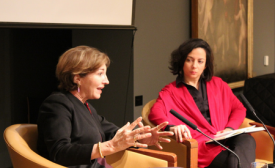digital diplomacy
The rise of Web 2.0 tools created a new, easy-to-use channel for diplomats and public diplomacy bureaus to reach far-flung publics. Many foreign ministries adopted the new technology almost immediately, creating a field called public diplomacy 2.0. New problems appeared quickly though.
Turkey's president on Friday ruled out any ban on Facebook and YouTube after Prime Minister Tayyip Erdogan said the sites could be shut to stop his foes anonymously posting audio recordings purportedly exposing corruption in his inner circle.

The rise of Web 2.0 tools created a new, easy-to-use channel for diplomats and public diplomacy bureaus to reach far-flung publics. Many foreign ministries adopted the new technology almost immediately, creating a field called public diplomacy 2.0. New problems appeared quickly though. Social media’s all-in participation creates an environment where messages cannot be controlled as they are framed and re-framed by the twittering masses.
Social media can be a powerful tool, especially when considering how it empowers regular people with the ability to reach a large audience. It certainly played a prominent role in the Arab Spring protests of 2010, when protestors took to Twitter and Facebook to document the uncensored reality of their experience.
Every year, select students from the USC Master of Public Diplomacy program at USC Annenberg travel abroad to conduct field research, which furthers the study of public diplomacy and international communications. This year, the Class of 2014 selected São Paulo, Brazil for its unique position in world politics.
In most African countries, if you send an email across town it makes a long and circuitous journey to North America or Europe or even Japan before arriving in the inbox of the intended recipient. That costs money in international connection charges and also results in a myriad of latency issues.
At a recent series of events in Beijing hosted by the Berggruen Institute, I was asked to speak about social media and the potential harm and good associated with it. My view is pretty straightforward -- I believe that social media is a tool of liberation and empowerment. That may seem fairly audacious when a good portion of the Western world is using Facebook and Twitter to post pictures of what they had for dinner or take quizzes on what TV character they may be.
Chinese internet company Sina plans to spin off its Twitter-like microblog service, Weibo, in a US initial public offering to raise US$500 million, a person with knowledge of the deal said on Tuesday. The person, who wasn’t authorised to speak publicly about the deal, said investment banks Goldman Sachs and Credit Suisse had been hired to manage the IPO in New York.







